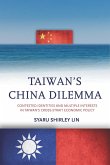J.P. Singh is Chair and Professor of Culture and Political Economy and Director of the Centre for Cultural Relations at the University of Edinburgh. Singh is the author of seven books and Series Editor of Emerging Frontiers in the Global Economy.
Hinweis: Dieser Artikel kann nur an eine deutsche Lieferadresse ausgeliefert werden.
Hinweis: Dieser Artikel kann nur an eine deutsche Lieferadresse ausgeliefert werden.








